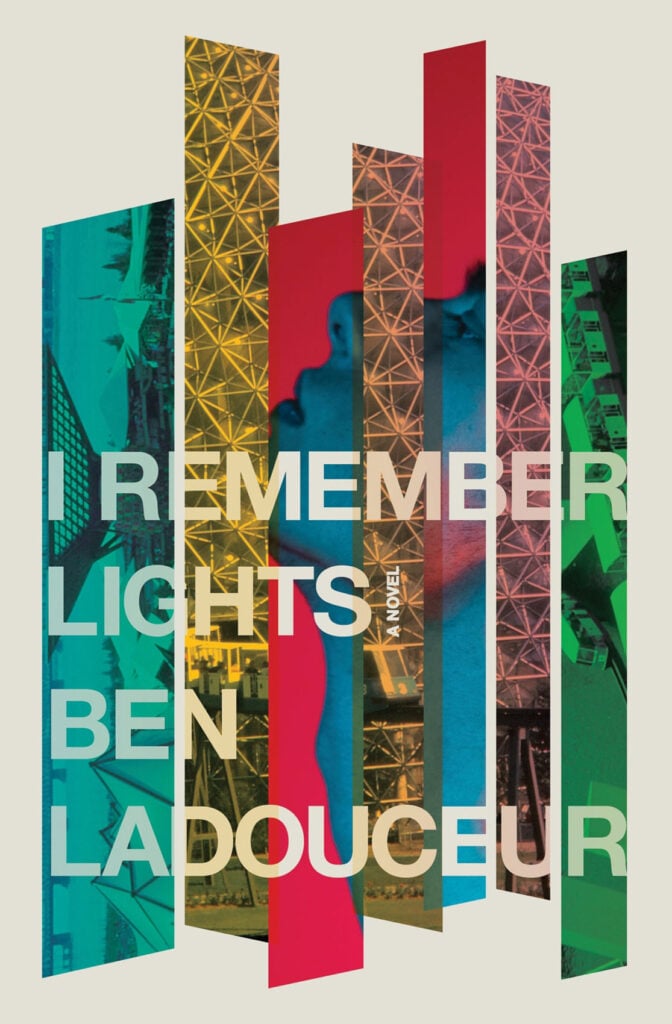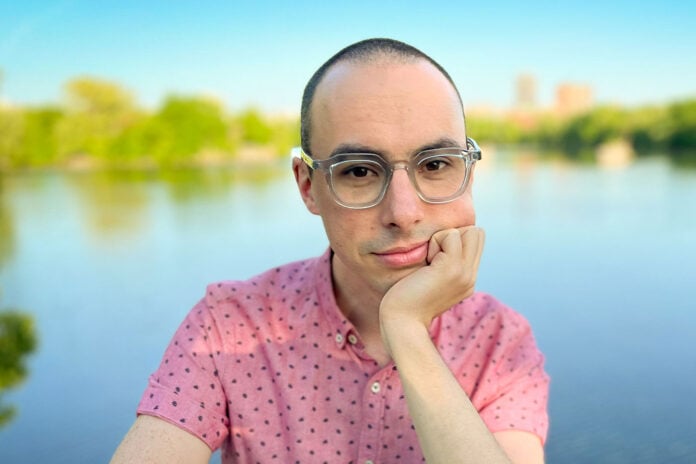Ottawa poet Ben Ladouceur loves Montreal so much he set his critically-acclaimed queer coming-of-age début novel I Remember Lights in the city.
The historical novel time travels to Montreal during Expo 67 and chronicles the fictional 19-year-old gay narrator’s coming out exploits and love life during the Summer of Love. The novel ends a decade later with the notorious real-life 1977 Le Mystique / Truxx raid when machine gun-toting Montreal police officers arrest 146 gay men as found-ins in a common bawdy house, in one of the largest mass arrests in Canadian queer history.
Ladouceur’s début novel is a splendid read that celebrates gay life and honours queer resistance and resilience.
Winner of the Writers’ Trust of Canada’s Dayne Ogilvie Prize for LGBTQ Emerging Writers and a finalist for a Lambda Literary Award, Ladouceur will be the 2026 Writer-in-Residence at the University of Ottawa. We recently sat down for a candid Q&A which has been edited for length and clarity.
How long did it take to write your novel, from conception to publication?
Ben Ladouceur: I was very fortunate to have a three-month writer’s residency at the Al Purdy A-Frame in 2016 where I thought, “Okay, well, I’ll go in in September and walk out in November with a novel.” That is not how it worked out. It took me eight years to write I Remember Lights.
What compelled you to write this novel that takes place 10 and 20 years before you were born in 1987?
Ben Ladouceur: I’ve always been fascinated with Expo 67. I watched an NFB documentary about Expo during my undergrad, then went to Ile Sainte-Hélène to visit the remaining sites. Everybody went to Expo 67, so many celebrities and recognizable faces from the era were there at some point. Everybody remembers it fondly. Expo 67 is about positivity and happiness, including from the queer angle. I mean, there are accounts of drag queens going to Expo in drag, it was a place where people felt a little more comfortable in their skin, including queer people. And it was very campy.
I also watched the 1978 20-minute documentary Truxx directed by Harry Sutherland because if you’re telling a queer story, it can be helpful to balance it with greater context. Then I interviewed Paul Keenan who was at Truxx the night of the raid, and who was also in the doc. Paul was able to provide a really detailed first-hand moment-by-moment account of that entire evening. Paul also connected me to Jeff Richstone, a lawyer who represented several men arrested at Truxx who wanted to stand up and fight what had been done to them. So my book ends the morning after the raid. It really was right place for the story to end.

Montreal is not just the setting of your novel, the city is a main character.
Ben Ladouceur: I got a good turnout and positive reactions at my Montreal book launch in June. This was meaningful because I’m not from Montreal. But I visited Montreal regularly when I was 19-20-21-years-old. I remember feeling enabled by the city, feeling less self-conscious about wearing a tank top! I also knew my novel’s main character would be 19 and would get caught up in the liberation that Montreal still offers.
Authenticity is essential to your historical novel. Small details like during the Truxx raid the found-ins put their hands up on a “brick wall”.
Ben Ladouceur: I tried my best to be mindful about material details like that.
Fifty million people attended Expo 67, everyone has specific memories, especially Montrealers. How important and intimidating was it for you to get the Expo 67 experience just right?
Ben Ladouceur: It was deeply intimidating and a real concern because there was a lot I didn’t know before I started writing the book. I had a baseline of knowledge of Expo, I had a baseline of knowledge about that era and the broad strokes of the queer experience, so the research and the writing coincided with each other. Because when you’re writing the story, it’s one thing, and when you publish it, that’s another thing. You have a responsibility when you do the publishing, but when you’re writing, if you get too hung up on making sure that you have everything right immediately, that can be paralyzing for a writer.
That crucial chapter near the end, when the Truxx found-ins are arrested, locked up in cells at the police station, then swabbed for sexually transmitted infections – how did you get those scenes just right?
Ben Ladouceur: From conversations with Paul and Jeff who gave me small details I never thought I would get.
People often mistakenly think that gay people led less happy and less heroic lives before Stonewall, and were more happy and heroic after Stonewall. Your novel upends this dichotomy.
Ben Ladouceur: I really love that you picked up on that. The novel has two storylines, one in which things are great for gay people who people don’t act particularly closeted in 1967. Then we have a second story 10 years later where gay people cannot take security for granted because it can disappear at any moment. Things do not always get better for gay people.
Montreal has two Stonewalls, Truxx in October 1977 and Sex Garage in July 1990. Few people have documented Sex Garage more than I have, and I sometimes feel the mythology of Sex Garage has displaced Truxx. Your novel helps redress this imbalance.
Ben Ladouceur: I think it is really important and empowering to remember our history. Edmund White’s book The Beautiful Room Is Empty is a really good example of this too – that book ends with the Stonewall Riots. It’s just so gratifying to see stories of queer history that really give us a sense of the humanity behind certain events and developments.
What was it like for you growing up gay in Ottawa?
Ben Ladouceur: I came out when I was 13-years-old. I went to Canterbury High School which is an arts school. It was a good setting in some ways to come out. A few people in my year came out, and I came out to my parents a year later. But coming out was still a struggle.
Are you in a relationship today?
Ben Ladouceur: Yes. My partner Scott is a singer and at the Ottawa book launch of I Remember Lights he performed songs by The Mamas & The Papas and The Righteous Brothers that are mentioned in the book!
Do you consider yourself a gay writer or a writer who happens to be gay?
Ben Ladouceur: I’ve been out as a gay person for as long as I’ve been a writer. It’s rare for me to write something that isn’t informed by that experience, be it poetry or fiction or even a book review. I also just finished writing another historical novel that is also very gay-themed. I can’t imagine publishing a book that isn’t gay or doesn’t address gay themes. So I guess that means I am a gay writer. And I love it.
INFOS | I Remember Lights by Ben Ladouceur is published by Book*hug Press.
Visit https://benladouceur.com


